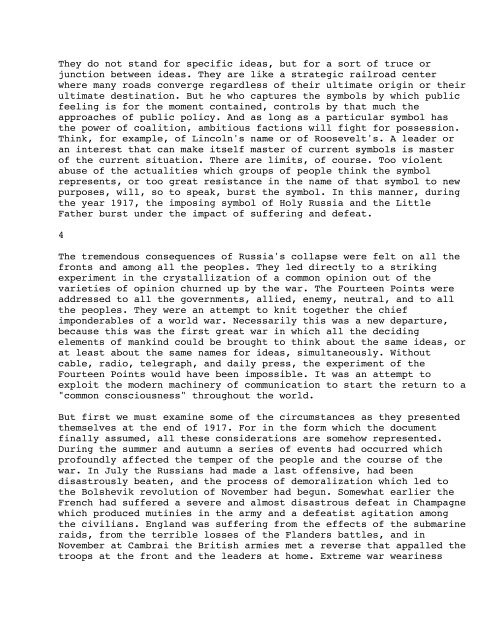PUBLIC OPINION by WALTER LIPPMANN TO FAYE LIPPMANN ...
PUBLIC OPINION by WALTER LIPPMANN TO FAYE LIPPMANN ...
PUBLIC OPINION by WALTER LIPPMANN TO FAYE LIPPMANN ...
You also want an ePaper? Increase the reach of your titles
YUMPU automatically turns print PDFs into web optimized ePapers that Google loves.
They do not stand for specific ideas, but for a sort of truce or<br />
junction between ideas. They are like a strategic railroad center<br />
where many roads converge regardless of their ultimate origin or their<br />
ultimate destination. But he who captures the symbols <strong>by</strong> which public<br />
feeling is for the moment contained, controls <strong>by</strong> that much the<br />
approaches of public policy. And as long as a particular symbol has<br />
the power of coalition, ambitious factions will fight for possession.<br />
Think, for example, of Lincoln's name or of Roosevelt's. A leader or<br />
an interest that can make itself master of current symbols is master<br />
of the current situation. There are limits, of course. Too violent<br />
abuse of the actualities which groups of people think the symbol<br />
represents, or too great resistance in the name of that symbol to new<br />
purposes, will, so to speak, burst the symbol. In this manner, during<br />
the year 1917, the imposing symbol of Holy Russia and the Little<br />
Father burst under the impact of suffering and defeat.<br />
4<br />
The tremendous consequences of Russia's collapse were felt on all the<br />
fronts and among all the peoples. They led directly to a striking<br />
experiment in the crystallization of a common opinion out of the<br />
varieties of opinion churned up <strong>by</strong> the war. The Fourteen Points were<br />
addressed to all the governments, allied, enemy, neutral, and to all<br />
the peoples. They were an attempt to knit together the chief<br />
imponderables of a world war. Necessarily this was a new departure,<br />
because this was the first great war in which all the deciding<br />
elements of mankind could be brought to think about the same ideas, or<br />
at least about the same names for ideas, simultaneously. Without<br />
cable, radio, telegraph, and daily press, the experiment of the<br />
Fourteen Points would have been impossible. It was an attempt to<br />
exploit the modern machinery of communication to start the return to a<br />
"common consciousness" throughout the world.<br />
But first we must examine some of the circumstances as they presented<br />
themselves at the end of 1917. For in the form which the document<br />
finally assumed, all these considerations are somehow represented.<br />
During the summer and autumn a series of events had occurred which<br />
profoundly affected the temper of the people and the course of the<br />
war. In July the Russians had made a last offensive, had been<br />
disastrously beaten, and the process of demoralization which led to<br />
the Bolshevik revolution of November had begun. Somewhat earlier the<br />
French had suffered a severe and almost disastrous defeat in Champagne<br />
which produced mutinies in the army and a defeatist agitation among<br />
the civilians. England was suffering from the effects of the submarine<br />
raids, from the terrible losses of the Flanders battles, and in<br />
November at Cambrai the British armies met a reverse that appalled the<br />
troops at the front and the leaders at home. Extreme war weariness





